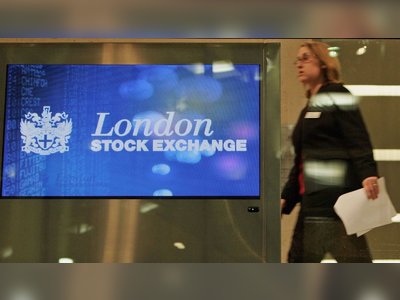
Controlling inflation is the battle of our times — and fortune will favour the bold
The Bank of England appears to be as confused as everybody when it comes to the outlook for interest rates. At the beginning of the month, a speech by the Bank’s Governor Andrew Bailey triggered hugely conflicting headlines. They ranged from “Bailey downplays talk of sharp rise in interest rates” to “interest rates may need to go higher” and through to “interest rates may have peaked”.
Meanwhile, members of the Bank’s rate-setting Monetary Policy Committee (MPC) like Catherine Mann and Swati Dhingra have adopted rather different views. I applaud the differences of opinion now emerging on the MPC. For too long it was open to accusations of groupthink. At least there is now evidence of genuine debate, even if Bailey’s own speech appears to offer a little too much by way of ambiguity.
Nevertheless, such debate suggests that we live in febrile economic times. No longer can we enjoy the combination of moderate growth and low inflation which characterised much of the period during which the Bank of England has controlled interest rates.
Such uncertainties are far from being uniquely British. At the beginning of the year, American investors began to believe that US policy rates were close to peaking. With inflation apparently tamed, there was genuine hope that before the year was out the Federal Reserve would be cutting interest rates again. This prompted a big rally in the stock market and a drop in longer-term borrowing costs. But since then American economic data has unexpectedly strengthened. There have been robust gains in employment and surprisingly strong increases in so-called “core” inflation, a measure that strips out the most volatile prices (for example, food and energy).
In response, the Federal Reserve’s chair, Jerome Powell, stated that “the ultimate level of interest rates is likely to be higher than previously anticipated”. He added that “if the totality of the data were to indicate that faster tightening is warranted, we would be prepared to increase the pace of rate hikes”.
This is strong stuff by central banking standards. The Fed has been in the vanguard of applying the monetary brakes, doing more than either the Bank of England or the European Central Bank. As yet, however, the US economy just isn’t doing what the Fed wants it to do. Powell clearly does not want to go down in history as the central banker who let inflation back in, but in the absence of any significant economic response so far, he risks one of two unpleasant outcomes: sustainably higher inflation or, in a bid to prevent such a result, a deep and unpleasant recession.
For the UK, the situation is arguably even more awkward. There’s a good chance that headline inflation will fall rapidly later this year, courtesy of declining gas prices. Yet pay growth is now relatively robust: excluding bonuses, wages in the private sector rose at an annual rate of 7.3 per cent in the final three months of 2022, a rate of increase hardly consistent with a two per cent inflation target over the medium term. Unless wage growth itself slows rapidly over the coming months, lower energy prices could trigger a reacceleration in consumer spending. What should the Bank then do? Cut rates because of lower headline inflation? Or raise rates because of robust wage growth and, just possibly, stronger domestic demand that later could lead to higher core inflation?
The Americans hoped they were in the former camp but have discovered they may be in a version of the latter camp. As for the UK, it is easy to pretend that the inflation we have suffered has stemmed only from malevolent foreign forces over which we have no control.
Imagine, however, if every country took the same view. We’d then be forced to conclude that inflation originated from Mars or Jupiter, not from planet Earth. While external shocks can be an important trigger for domestic inflation, its persistence ultimately depends not just on the length of those shocks but also on what the monetary authorities do in response. Those who act with sufficient confidence may ultimately keep inflation under control. Those who prefer, instead, to wait may discover they have opened a Pandora’s Box of domestic inflationary difficulties.
Stephen King (@kingeconomist) is HSBC’s Senior Economic Adviser. His new book, We Need to Talk About Inflation (Yale), will be published in April
Nevertheless, such debate suggests that we live in febrile economic times. No longer can we enjoy the combination of moderate growth and low inflation which characterised much of the period during which the Bank of England has controlled interest rates.
Such uncertainties are far from being uniquely British. At the beginning of the year, American investors began to believe that US policy rates were close to peaking. With inflation apparently tamed, there was genuine hope that before the year was out the Federal Reserve would be cutting interest rates again. This prompted a big rally in the stock market and a drop in longer-term borrowing costs. But since then American economic data has unexpectedly strengthened. There have been robust gains in employment and surprisingly strong increases in so-called “core” inflation, a measure that strips out the most volatile prices (for example, food and energy).
In response, the Federal Reserve’s chair, Jerome Powell, stated that “the ultimate level of interest rates is likely to be higher than previously anticipated”. He added that “if the totality of the data were to indicate that faster tightening is warranted, we would be prepared to increase the pace of rate hikes”.
This is strong stuff by central banking standards. The Fed has been in the vanguard of applying the monetary brakes, doing more than either the Bank of England or the European Central Bank. As yet, however, the US economy just isn’t doing what the Fed wants it to do. Powell clearly does not want to go down in history as the central banker who let inflation back in, but in the absence of any significant economic response so far, he risks one of two unpleasant outcomes: sustainably higher inflation or, in a bid to prevent such a result, a deep and unpleasant recession.
For the UK, the situation is arguably even more awkward. There’s a good chance that headline inflation will fall rapidly later this year, courtesy of declining gas prices. Yet pay growth is now relatively robust: excluding bonuses, wages in the private sector rose at an annual rate of 7.3 per cent in the final three months of 2022, a rate of increase hardly consistent with a two per cent inflation target over the medium term. Unless wage growth itself slows rapidly over the coming months, lower energy prices could trigger a reacceleration in consumer spending. What should the Bank then do? Cut rates because of lower headline inflation? Or raise rates because of robust wage growth and, just possibly, stronger domestic demand that later could lead to higher core inflation?
The Americans hoped they were in the former camp but have discovered they may be in a version of the latter camp. As for the UK, it is easy to pretend that the inflation we have suffered has stemmed only from malevolent foreign forces over which we have no control.
Imagine, however, if every country took the same view. We’d then be forced to conclude that inflation originated from Mars or Jupiter, not from planet Earth. While external shocks can be an important trigger for domestic inflation, its persistence ultimately depends not just on the length of those shocks but also on what the monetary authorities do in response. Those who act with sufficient confidence may ultimately keep inflation under control. Those who prefer, instead, to wait may discover they have opened a Pandora’s Box of domestic inflationary difficulties.
Stephen King (@kingeconomist) is HSBC’s Senior Economic Adviser. His new book, We Need to Talk About Inflation (Yale), will be published in April










